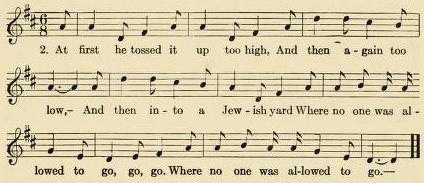The Jewish Lady- Johnson (NC) 1942 Brown D
[From: The Brown Collection of NC Folklore, Vol. 2, 1952. A Brown editor's notes follow. Music at bottom of page from Volume 4. Date is circa 1880.
R. Matteson 2013, 2015]
34. Sir Hugh; or, The Jew's Daughter (Child 155) Brown Collection
It is odd, in view of its theme, which is really the ritual murder of a Christian child by Jews, that this ballad should have persisted as it has in popular favor down to our own times. It has been reported fairly recently as traditional song in three shires of England, in the Bahamas, in Nova Scotia, and in nearly a score of regional collections in the United States. See BSM 69-70, and add to the references there given Lincolnshire (ECS 86), Miss Mason's Nursery Rhymes and Country Songs 46-7, Vermont (NGMS 254-6), Tennessee (BTFLS viii 76-8), Florida (SFLQ VIII 154-5), the Ozarks (OFS I 149-56), Ohio (BSO 66-7), Indiana (BSI 128-33), and Wisconsin (JAFL lii 43-4)- Probably the simple pathos of the little child's death rather than any conscious anti-Semitism explains its persistence. Indeed two of our four texts from North Carolina have lost any trace of the Jew's daughter, as modern texts in general have lost sight of the second element of the original story, the miraculous intervention of Our Lady to restore the child to life. The Brown Collection proper has only one version, our A; the other three have been contributed by Professor Hudson from his own collection.
D. 'The Jewish Lady.' Sent to Professor Hudson in May 1942 by Miss Margaret Johnson, with the tune and the following notation : "My mother, who is seventy years old, sings the song about the Jewish lady. . . . Mother doesn't know where she learned it, and says she has known it all her life. She was born and reared in Raleigh, right in the house where we now live." The first stanza was imperfectly remembered.
1 A little boy went out one day, [or to play]
Went out to toss his ball,
Went out to toss his ball ball ball.
Went out to toss his ball.
2 At first he tossed it up too high
And then again too low,
And then into a Jewish yard
Where no one was allowed to go go go,
Where no one was allowed to go.
3 A Jewish lady came to the door
All dressed in silk and lace.
'Come in, come in, my dear little boy,
And you shall have your ball again, gain, gain,
And you shall have your ball again.'
4 'I can't come in, I won't come in
Unless my playmates come too,
For I have often heard of a little boy
Who never came back again gain gain,
Who never came back again.'
5 She asked him into the sitting-room
And then into the hall,
And then into the dining-room
Where no one could hear him call, call, call,
Where no one could hear him call.
6 'Pray spare my life, pray spare my life,'
The little boy then cried,
'And when I grow to be a man
My treasures shall all be thine thine thine,
My treasures shall all be thine.'
7 She tied a handkerchief o'er his eyes,
His hands behind his back.
And then she took a carving knife
And pierced his little heart through through through,
And pierced his little heart through.
D. 'The Jewish Lady.' Sung by the mother of Miss Margaret Johnson, ms score received by the present editor in 1952 through the kindness of Professor Hudson. The melodic line of this tune is only a variation of that sung by Mrs. Bray (34B).

For melodic relationship cf. **BSO 66, No. 20; JAFL xxxix (1926), 213; BMFSB 22. Scale: Heptachordal. Tonal Center: d. Structure: abb1cc1 (2,2,2,2,2) = ab (4,6); b is terminally incremented.